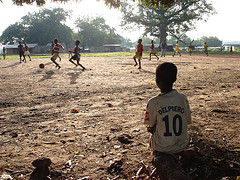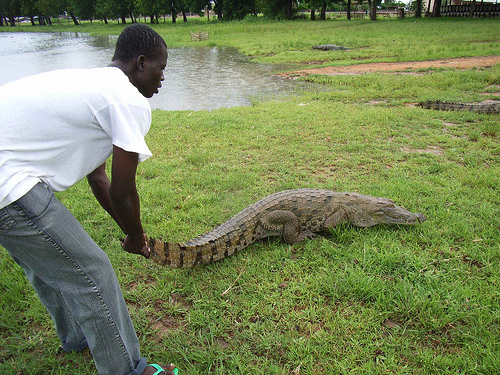
Ghana. That doesn’t sound very exciting; but, Ghana 2 USA 1 was definitely a very exciting headline at the 2006 FIFA World Cup in Germany. That day, Ghana was filled with jubilation and excitement—not just because it had beaten the United States, but also, that it had caught the world’s attention by making it into the knockout stage. Traffic came to a standstill; drivers stopped their cars in the middle of the road and were frantically waving the flag of Ghana. That day, for first time in my life, I was proud to be Ghanaian. I said to myself, “Finally, the world will remember us for something other than war, poverty and disease.” In retrospect, I think I should have referred to “soccer fans” instead of “the world” because only soccer fans know Ghana as “that African country that beat the United States.” Why am I saying this?

Very few people know that Ghana is the world’s leading producer of cocoa, or that Ghana has the largest man-made lake in the world or that last March, half the leaders of the African continent joined us to celebrate our 50th independence anniversary. Most people also don’t know that there are some crocodiles in Ghana that simply don’t harm humans. On the other hand, I will not be surprised if I find an American who knows more about AIDS in Africa than I do, even if we both grew up watching CNN. Of a truth, unlike him, for a long time my only real source of information was CNN; he may have had other sources of information besides CNN that may also have focused only on reporting every single negative detail about Africa, just like CNN. I remember asking my mom when I was young, “Mom, how come every time they [CNN] talk about Africa, it’s always about war, poverty or diseases? Isn’t there anything good about Africa?” She replied, “Since the era of the slave trade and colonialism, we Africans are most at times equated to everything low and negative. So if it’s not about war, poverty, disease or some other negative thing, Africa rarely comes in the news.”

Watching CNN everyday became a habit even though I did not like most of the coverage concerning Africa. Through CNN, I learned about the challenges facing African countries and the continent as a whole. When I say “challenges” I’m actually referring to every single effect that Acquired Immune Deficiency Syndrome has had on the once so mysterious but beautiful continent of Africa. Besides watching CNN, I read newspaper articles about HIV/AIDS and saw HIV/AIDS ads on TV. I also attended a workshop on AIDS about three years ago, and just weeks before coming to Colgate I attended a two-day seminar about the factors contributing to increased HIV infections. Needless to say, I had become quite an expert. When I was asked to guess the cumulative number of AIDS cases (total number of deaths due to AIDS) recorded in Ghana, I thought for a while, weighing all that I’d ever heard about AIDS in Ghana, before guessing. When the actual data was handed to me, I was stunned. Initially, I thought my guess of about 600,000 cumulative AIDS cases was low, but after seeing that as of 2002 only 64,316 cases had been reported, I was shocked. Though a part of me was glad that the number of cases was much lower than I had anticipated, another part of me couldn’t get over the fact that I was wrong. As I sat there, I remembered the ad on TV which said that “every day 200 Ghanaians get infected with HIV”. I remembered how irate one of the facilitators at the seminar I attended was, because someone in Parliament had suggested that condoms be distributed to junior high schools in order to curb the incidence of teenage pregnancy and the spread of HIV/AIDS and other STDs. I remembered how scared I was when I was shown pictures of people with full blown AIDS and a host of other opportunistic infections. As much as I tried all I could say was, “But they said we were dying…”